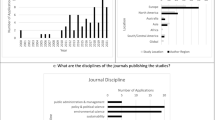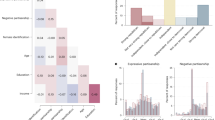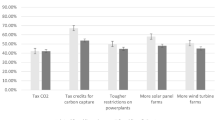Abstract
Extreme weather events may provide opportunities to raise public awareness and spur action to address climate change. Using concepts from the study of social movements, we conducted a systematic comparative-case analysis of 15 communities that experienced extreme weather events in the United States between 2012 and 2015 to identify under what conditions, and through what mechanisms, the experience of an extreme weather event generates community discussion and collective action linked to climate change. Although collective action related to climate change was rare post-event, we observed community discussion about the event’s link to climate change in slightly more than half of the cases, especially in Democratic and/or highly educated communities that experienced events for which attribution to climate change is more certain. Our results suggest that, although a single event may have limited impact on discussion or collective action about climate change, partisanship and an event’s attribution to climate change matter.
This is a preview of subscription content, access via your institution
Access options
Access Nature and 54 other Nature Portfolio journals
Get Nature+, our best-value online-access subscription
$29.99 / 30 days
cancel any time
Subscribe to this journal
Receive 12 print issues and online access
$209.00 per year
only $17.42 per issue
Buy this article
- Purchase on Springer Link
- Instant access to full article PDF
Prices may be subject to local taxes which are calculated during checkout

Similar content being viewed by others
Data availability
Data used in this analysis are available at: https://osf.io/kxm23/.
Code availability
Programming code used in this analysis is available at: https://osf.io/kxm23/.
References
National Academies of Sciences, Engineering, and Medicine Attribution of Extreme Weather Events in the Context of Climate Change (The National Academies, 2016).
Brody, S. D., Zahran, S., Vedlitz, A. & Grover, H. Examining the relationship between physical vulnerability and public perceptions of global climate change in the United States. Environ. Behav. 40, 72–95 (2008).
Capstick, S. B. et al. Public Perception of Climate Change in Britain following the Winter 2013/2014 Flooding Understanding Risk Research Group Working Paper 15-01 (Cardiff Univ., 2015).
Howe, P. D., Markowitz, E. M., Lee, T. M., Ko, C.-Y. & Leiserowitz, A. Global perceptions of local temperature change. Nat. Clim. Change 3, 352–356 (2013).
Howe, P. D., Boudet, H., Leiserowitz, A. & Maibach, E. W. Mapping the shadow of experience of extreme weather events. Climatic Change 127, 381–389 (2014).
Reser, J. P., Bradley, G. L. & Ellul, M. C. Encountering climate change: ‘seeing’ is more than ‘believing’. WIREs Clim. Change 5, 521–537 (2014).
Weber, E. U. What shapes perceptions of climate change? New research since 2010. WIREs Clim. Change 7, 125–134 (2016).
Egan, P. J. & Mullin, M. Climate change: US public opinion. Annu. Rev. Polit. Sci. 20, 209–227 (2017).
Renn, O. The social amplification/attenuation of risk framework: application to climate change. WIREs Clim. Change 2, 154–169 (2011).
Birkland, T. A. Focusing events, mobilization, and agenda setting. J. Public Policy 18, 53–74 (1998).
McAdam, D. Social movement theory and the prospects for climate change activism in the United States. Annu. Rev. Polit. Sci. 20, 189–208 (2017).
Hamilton, L. C., Wake, C. P., Hartter, J., Safford, T. G. & Puchlopek, A. J. Flood realities, perceptions and the depth of divisions on climate. Sociology 50, 913–933 (2016).
Marquart-Pyatt, S. T., McCright, A. M., Dietz, T. & Dunlap, R. E. Politics eclipses climate extremes for climate change perceptions. Glob. Environ. Change 29, 246–257 (2014).
Konisky, D. M., Hughes, L. & Kaylor, C. H. Extreme weather events and climate change concern. Climatic Change 134, 533–547 (2016).
Ray, A., Hughes, L., Konisky, D. M. & Kaylor, C. Extreme weather exposure and support for climate change adaptation. Glob. Environ. Change 46, 104–113 (2017).
Sisco, M. R., Bosetti, V. & Weber, E. U. When do extreme weather events generate attention to climate change? Climatic Change 143, 227–241 (2017).
Borick, C. P. & Rabe, B. G. in Oxford Research Encyclopedia of Climate Science (eds Nisbet, M. C. et al.) https://doi.org/10.1093/acrefore/9780190228620.013.311 (Oxford Univ. Press, 2017).
Myers, T. A., Maibach, E. W., Roser-Renouf, C., Akerlof, K. & Leiserowitz, A. A. The relationship between personal experience and belief in the reality of global warming. Nat. Clim. Change 3, 343–347 (2013).
Spence, A., Poortinga, W., Butler, C. & Pidgeon, N. F. Perceptions of climate change and willingness to save energy related to flood experience. Nat. Clim. Change 1, 46–49 (2011).
Howe, P. D., Marlon, J. R., Wang, X. & Leiserowit, A. Public perceptions of the health risks of extreme heat across US states, counties, and neighborhoods. Proc. Natl Acad. Sci. USA 116, 6743–6748 (2019).
Shepard, S., Boudet, H., Zanocco, C. M., Cramer, L. A. & Tilt, B. Community climate change beliefs, awareness, and actions in the wake of the September 2013 flooding in Boulder County, Colorado. J. Environ. Stud. Sci. 8, 312–325 (2018).
Zanocco, C. et al. Place, proximity, and perceived harm: extreme weather events and views about climate change. Climatic Change 149, 349–365 (2018).
Albright, E. A. & Crow, D. Beliefs about climate change in the aftermath of extreme flooding. Climatic Change 155, 1–17 (2019).
Mullin, M. & Rubado, M. E. Local response to water crisis: explaining variation in usage restrictions during a Texas drought. Urban Affairs Rev. 53, 752–774 (2017).
Norgaard, K. M. Living in Denial: Climate Change, Emotions, and Everyday Life (MIT, 2011).
Lang, C. Do weather fluctuations cause people to seek information about climate change? Climatic Change 125, 291–303 (2014).
Lang, C. & Ryder, J. D. The effect of tropical cyclones on climate change engagement. Climatic Change 135, 625–638 (2016).
Kirilenko, A. P., Molodtsova, T. & Stepchenkova, S. O. People as sensors: mass media and local temperature influence climate change discussion on Twitter. Glob. Environ. Change 30, 92–100 (2015).
Zahran, S., Brody, S. D., Grover, H. & Vedlitz, A. Climate change vulnerability and policy support. Soc. Nat. Resour. 19, 771–789 (2006).
Carmin, J. Resources, opportunities and local environmental action in the democratic transition and early consolidation periods in the Czech Republic. Environ. Polit. 12, 42–64 (2003).
McAdam, D., McCarthy, J. D. & Zald, M. N. Comparative Perspectives on Social Movements: Political Opportunities, Mobilizing Structures, and Cultural Framings (Cambridge Univ. Press, 1996).
Almeida, P. D. Opportunity organizations and threat-induced contention: protest waves in authoritarian settings. Am. J. Sociol. 109, 345–400 (2003).
Snow, D. A., Rochford, E. B., Worden, S. K. & Benford, R. D. Frame alignment processes, micromobilization, and movement participation. Am. Sociol. Rev. 51, 464–481 (1986).
Walsh, E. J. & Warland, R. H. Social movement involvement in the wake of a nuclear accident: activists and free riders in the TMI area. Am. Sociol. Rev. 48, 764–780 (1983).
Olzak, S. Analysis of events in the study of collective action. Annu. Rev. Sociol. 15, 119–141 (1989).
José, Holguín-Veras et al. Material convergence: important and understudied disaster phenomenon. Nat. Hazards Rev. 15, 1–12 (2014).
McAdam, D. & Boudet, H. Putting Social Movements in their Place: Explaining Opposition to Energy Projects in the United States, 2000–2005 (Cambridge Univ. Press, 2012).
Kirchherr, J., Charles, K. J. & Walton, M. J. Multi-causal pathways of public opposition to dam projects in Asia: a fuzzy set qualitative comparative analysis (fsQCA). Glob. Environ. Change 41, 33–45 (2016).
Wright, R. A. & Boudet, H. S. To act or not to act: context, capability, and community response to environmental risk. Am. J. Sociol. 118, 728–777 (2012).
Bartley, T. & Child, C. Shaming the corporation. Am. Sociol. Rev. 79, 653–679 (2014).
Brügger, A., Dessai, S., Devine-Wright, P., Morton, T. & Pidgeon, N. Psychological responses to the proximity of climate change. Nat. Clim. Change 5, 1031–1037 (2015).
Brügger, A., Morton, T. A. & Dessai, S. ‘Proximising’ climate change reconsidered: a construal level theory perspective. J. Environ. Psychol. 46, 125–142 (2016).
Schuldt, J. P., Rickard, L. N. & Yang, Z. J. Does reduced psychological distance increase climate engagement? On the limits of localizing climate change. J. Environ. Psychol. 55, 147–153 (2018).
Süsser, D. Coastal dwellers-power against climate change: a place-based perspective on individual and collective engagement in North Frisia. J. Coast. Conserv. 22, 169–182 (2018).
Ballew, M. T. et al. Climate change in the American mind: data, tools, and trends. Environ. Sci. Policy Sustain. Dev. 61, 4–18 (2019).
Smith, M. & Schwartz, J. In flood-hit Midwest, mayors see climate change as a subject best avoided. The New York Times (15 May 2019).
Zanocco, C. M., Boudet, H. S., Nilson, R. & Flora, J. Personal harm and support for climate change mitigation policies: evidence from 10 US communities impacted by extreme weather. Glob. Environ. Change 59, 101984 (2019).
Birkland, T. A. Lessons of Disaster: Policy Change after Catastrophic Events (Georgetown Univ. Press, 2006).
Birkland, T. A. & Schwaeble, K. L. Agenda Setting and the Policy Process: Focusing Events (Oxford Univ. Press, 2019).
Albright, E. A. & Crow, D. A. Learning in the aftermath of extreme floods: community damage and stakeholder perceptions of future risk. Risk Hazards Crisis Public Policy 6, 308–328 (2015).
Carvalho, A. & Burgess, J. Cultural circuits of climate change in UK. Broadsheet newspapers, 1985–2003. Risk Anal. 25, 1457–1469 (2005).
Election 2008: President Map. The New York Times https://www.nytimes.com/elections/2008/results/president/map.html (2008).
Election 2012: President Map. The New York Times https://www.nytimes.com/elections/2012/results/president.html (2012).
Social Explorer: 2011–15 American Community Survey 5-year Estimates (US Census Bureau, accessed 3 May 2017); https://www.socialexplorer.com/
NCCS Data Archive (National Center for Charitable Statistics, accessed 12 June 2017); https://nccs.urban.org/
O’Neil, T. A hot one for the ages: records best left unbroken St. Louis Post-Dispatch A1 (9 July 2012).
Harmon, D. Deluge Turns Deadly—2 Dead in Storm Austin American-Statesman (1 November 2013).
City of Austin and Travis County After Action Report ‘Halloween Flood—October 31, 2013’ (City of Austin and Travis County, 2014); https://www.austintexas.gov/sites/default/files/files/hsem/City-County_Halloween_Flood_After_Action_Report.pdf
Chang, J. & Beach, P. 531 flooded homes get warnings—damage ‘widespread’ from storm flooding; Austin declares disaster Austin American-Statesman (5 November 2013).
Mashhood, F. Austin will receive federal aid for floods—FEMA will pay agencies three-quarters of costs related to the disaster Austin American-Statesman (21 December 2013).
Managing Floods in Flash Flood Alley (Lower Colorado River Authority); http://www.lcra.org/water/floods/pages/default.aspx
Lim, A. & Robards-Forbes, E. Austinites sift through debris of flooded homes—volunteers fan out to offer food, supplies to weary neighbors Austin American-Statesman (3 November 2013).
Recovery—NCO relief fund provides $700,000 to date. Lake County Record Bee 2 (9 October 2015).
Krohn, K. Evacuees making the best of it Lake County Record Bee 1 (17 September 2015).
Recovery—Thompson secures funds for damaged roads, highways. Lake County Record Bee 1 (23 September 2015).
Faries, D. Valley fire—sheriff: ‘worst tragedy I’ve seen’ Lake County Record Bee 1 (15 September 2015).
Faries, D. Recovery—more than 2,300 register with FEMA Lake County Record Bee 1 (6 October 2015).
Valley fire: emergency aid—FEMA declares state of emergency—will help pay for firefighting efforts Lake County Record Bee 5 (14 September 2015).
Quirino, B. Containment expected next week Lake County Record Bee 1 (30 September 2015).
Fast Facts for the Tornado Outbreak of May 20, 2013 (National Weather Service, 2019); https://www.weather.gov/oun/events-20130520-fastfacts
Hampton, J. Officials vow not to quit looking until everyone is found. The Moore American (22 May 2013).
Kinney, M. Tornado leaves Moore in shambles, but not broken—walking the path of devastation. The Moore American (26 May 2013).
Hampton, J. Real estate investors seek deals. The Moore American (31 July 2013).
Rieger, A. City manager has been through it all before. The Moore American (23 May 2013).
Horning, C. Deadly tornado nearly follows path of ’99 storm. The Moore American (21 May 2013).
Landau, E. No evidence global warming spawned twister. CNN (22 May 2013).
The Spatial Hazard Events and Losses Database for the United States version 17.0 (Center for Emergency Management and Homeland Security, accessed 26 September 2015).
US Billion-Dollar Weather and Climate Disasters (NOAA National Centers for Environmental Information, accessed 16 May 2016); https://www.ncdc.noaa.gov/billions/
Tierney, K. J. From the margins to the mainstream? Disaster research at the crossroads. Annu. Rev. Sociol. 33, 503–525 (2007).
Howe, P. D., Mildenberger, M., Marlon, J. R. & Leiserowitz, A. Geographic variation in opinions on climate change at state and local scales in the USA. Nat. Clim. Change 5, 596–603 (2015).
Weiss, R. S. Learning from Strangers: the Art and Method of Qualitative Interview Studies (Maxwell Macmillan International, 1994).
Ragin, C. C. Fuzzy-Set Social Science (Univ. Chicago Press, 2000).
Ragin, C. C. Redesigning Social Inquiry: Fuzzy Sets and Beyond (Univ. Chicago Press, 2008).
Schneider, C. Q. & Wagemann, C. Set-Theoretic Methods for the Social Sciences: A Guide to Qualitative Comparative Analysis (Cambridge Univ. Press, 2012).
Rihoux, B. & Ragin, C. C. Configurational Comparative Methods: Qualitative Comparative Analysis (Sage Publications, Inc., 2009).
Ragin, C. C. The Comparative Method: Moving Beyond Qualitative and Quantitative Strategies (Univ. California Press, 1987).
Ragin, C. C. Set relations in social research: evaluating their consistency and coverage. Polit. Anal. 14, 291–310 (2006).
Ragin, C. C. in The Oxford Handbook of Political Methodology (eds Box-Steffensmeier, J. M., Brady, H. E. & Collier, D. 174–198 (Oxford Univ. Press, 2008).
Thiem, A. & Duşa, A. QCA: a package for qualitative comparative analysis. R J. 5, 87–97 (2013).
Duşa, A. in QCA with R: A Comprehensive Resource (ed. Duşa, A.) 19–46 (Springer, 2019).
McDonald, R. I., Chai, H. Y. & Newell, B. R. Personal experience and the ‘psychological distance’ of climate change: an integrative review. J. Environ. Psychol. 44, 109–118 (2015).
Bohr, J. Is it hot in here or is it just me? Temperature anomalies and political polarization over global warming in the American public. Climatic Change 142, 271–285 (2017).
Carmichael, J. T., Brulle, R. J. & Huxster, J. K. The great divide: understanding the role of media and other drivers of the partisan divide in public concern over climate change in the USA, 2001–2014. Climatic Change 141, 599–612 (2017).
Dunlap, R. E. & McCright, A. M. Social movement identity: validating a measure of identification with the environmental movement. Social Sci. Quart. 89, 1045–1065 (2008).
O’Connor, R. E., Bord, R. J., Yarnal, B. & Wiefek, N. Who wants to reduce greenhouse gas emissions? Social Sci. Quart. 83, 1–17 (2002).
Hamilton, L. C., Hartter, J., Lemcke-Stampone, M., Moore, D. W. & Safford, T. G. Tracking public beliefs about anthropogenic climate change. PLoS ONE 10, e0138208 (2015).
Malka, A., Krosnick, J. A. & Langer, G. The association of knowledge with concern about global warming: trusted information sources shape public Thinking. Risk Anal. 29, 633–647 (2009).
McCright, A. M. & Dunlap, R. E. The politicization of climate change and polarization in the American public’s views of global warming, 2001–2010. Sociol. Quart. 52, 155–194 (2011).
Brulle, R. J., Carmichael, J. & Jenkins, J. C. Shifting public opinion on climate change: an empirical assessment of factors influencing concern over climate change in the US, 2002–2010. Climatic Change 114, 169–188 (2012).
Cody, E. M., Stephens, J. C., Bagrow, J. P., Dodds, P. S. & Danforth, C. M. Transitions in climate and energy discourse between Hurricanes Katrina and Sandy. J. Environ. Stud. Sci. 7, 87–101 (2017).
Sherman, D. J. Not Here, Not There, Not Anywhere: Politics, Social Movements, and the Disposal of Low-Level Radioactive Waste (Routledge, 2011).
Molotch, H., Freudenburg, W. & Paulsen, K. E. History repeats itself, but how? City character, urban tradition, and the accomplishment of place. Am. Sociol. Rev. 65, 791–823 (2000).
Destro, L. & Holguín-Veras, J. Material convergence and its determinants: case of Hurricane Katrina. Transp. Res. Rec. 2234, 14–21 (2011).
Nelan, M. M., Wachtendorf, T. & Penta, S. Agility in disaster relief: a social construction approach. Risk Hazards Crisis Public Policy 9, 132–150 (2018).
Acknowledgements
We express our sincere thanks to our interview participants. We also acknowledge the data collection efforts of N. Downing, C. Flathers, J. Knobloch, R. Nilson, S. Shepard and I. Widiyasari, as well as helpful advice we received from J. Flora and D. McAdam. This work was supported by a grant from the National Science Foundation, Sociology Program (no. 1357055).
Author information
Authors and Affiliations
Contributions
H.B. conceived the study, secured funding, supervised the project and wrote the paper. L.G. analysed data and wrote the paper. C.Z., H.S. and H.W. collected data and contributed to the analysis.
Corresponding author
Ethics declarations
Competing interests
The authors declare no competing interests.
Additional information
Peer review information Nature Climate Change thanks Jeroen van der Heijden and the other, anonymous, reviewer(s) for their contribution to the peer review of this work.
Publisher’s note Springer Nature remains neutral with regard to jurisdictional claims in published maps and institutional affiliations.
Extended data
Extended Data Fig. 1
Map of selected cases of extreme weather events, 2012–2015.
Supplementary information
Supplementary Information
Supplementary Tables 1–22, Notes 1–5 and Fig. 1.
Rights and permissions
About this article
Cite this article
Boudet, H., Giordono, L., Zanocco, C. et al. Event attribution and partisanship shape local discussion of climate change after extreme weather. Nat. Clim. Chang. 10, 69–76 (2020). https://doi.org/10.1038/s41558-019-0641-3
Received:
Accepted:
Published:
Issue Date:
DOI: https://doi.org/10.1038/s41558-019-0641-3
This article is cited by
-
Financial constraints and short-term planning are linked to flood risk adaptation gaps in US cities
Communications Earth & Environment (2024)
-
Choosing a path
Nature Climate Change (2023)
-
Exploring disaster impacts on adaptation actions in 549 cities worldwide
Nature Communications (2022)
-
Fleeing the unsustainable city: soft policy and the dual effect of social capital in hurricane evacuation
Sustainability Science (2022)
-
Pathway for the low-carbon consumption pattern transition of residents in six eastern coastal provinces of China: using fuzzy-set qualitative comparative analysis with panel data
Environmental Science and Pollution Research (2022)



